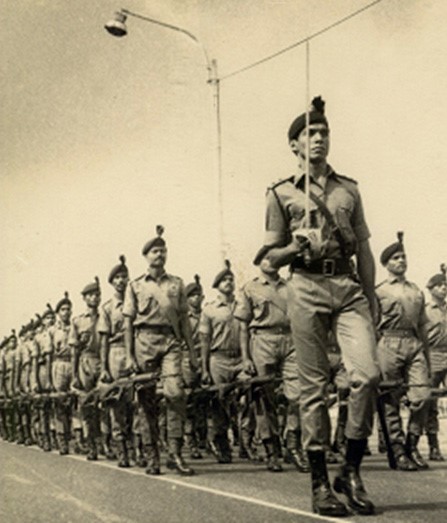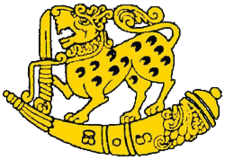A list each of warrant officers and non-commissioned officers of these three regular infantry battalions were maintained on a common seniority list. Many unit transfers and promotions were made to fill vacancies in other battalions within the Corps. These promotions created displeasure and therefore often referred to as 'Parachute Promotions'. Besides creating problems with regard to uniforms, buttons and badges and adaptation to drill, it had a direct impact on the morale of the members of all battalions. On 7th July 1968, a Board of Officers from the three regular infantry battalions was appointed by the Army Headquarters to look into this complex situation and to make recommendations overcome same. Major TSB Sally from Sinha Regiment was appointed as the President of this Board. Having considered the grievances of officers and other ranks who received inter-battalions transfers tendered in a report giving with it suggestions aimed at overcoming the situation. Consequent to this report, the Corps of Infantry (Regulars) of the Army was disbanded, with effect from 1stApril 1969. The officers and other ranks were given an opportunity of getting into any battalion of their preference.
In mid 1963, in addition to his appointment as the Commanding Officer of the 1st Battalion Ceylon Sinha Regiment, Colonel RD Jayetillake MBE was appointed as the Commander Army Force Panagoda. On 19th August 1963, 5 officers and 150 other ranks together with the Battalion Headquarters shifted to Panagoda leaving the balance troops at Diyatalawa.
In 1963, the Army held a tattoo named as the 'Army Search Light Tattoo' in Colombo. All Battalions of the Army had a part to play at the show where military activities and skills were put on display. The presentation by the Sinha Regiment presented was a drill display with arms to the beat of drums and music. It was very popular among the many people who witnessed the show and to the men of the Regiment it became its pride.
Staff Sergeant Morseth TFB introduced to the Regiment the performance of arms drill and making various formations in the absence of words of command but to music played by a band in attendance. He joined the Sinha Regiment from the 1st Ceylon Light Infantry at the very beginning and later in his career was promoted to the rank of Warrant Officer. He followed a special course on drill at Purbright in England and proved to be an exemplary Drill Instructor. When words of command in Sinhala officially replaced commands in English, it was Warrant Officer Morseth who was Malay who was chosen to demonstrate to all troops on detached duties, how the new words of command had to be given in Sinhala. He was commissioned as a Lieutenant Quartermaster in the 1st Battalion Ceylon Sinha Regiment and eventually retired as a Captain Quartermaster earning the admiration of his senior colleagues and troops alike.

Lieutenant Wasantha Perera leading the troops of the 1stBattalion Sri Lanka Sinha Regiment at the Independence Day Parade held at the Galle Face in Colombo
In 1989, with the JVP uprising against the government becoming widespread the internal security situation soon called for the mobilization of retired officers. Captain TFB Morseth offered his services from retirement and was posted to the Coordinating Office in the Kalutara District as a Staff Officer. He dedicated his efforts with customary zeal but sadly, was soon to be killed by an insurgent thus, the country lost an exemplary officer.
In February 1964, the Regiment took part in the Independence Day Parade held at Galle and the troops were called upon to perform arms drill to music and came off with a grand display.
On 6thFebruary the Battalion took over anti-illegal immigration duties under the new TaFII organization.
20thMarch 1964 saw a change of command when Lieutenant Colonel LHD de Silva succeeded Colonel RD Jayatilleke MBE who at the time had been the Commanding Officer for seven years.
In May 1964 the Battalion took over duties at Iluppaikadavei, Silavathurai, and Mannar Island. The Battalion Headquarters which until then was located at Diyatalawa was moved to Thalladi, Mannar. On 6thSeptember 1964 on completion of TaFII in Mannar the Battalion relocated to the Race Course in Colombo. Although the troops expected to enjoy 'berrer' facilities in Colombo they soon realized that it was not to be. The troops lived under canvas tents. All toilets were covered with jute hessian and on rainy days walking between tents was difficult as the toilets and gutters over flowed causing the surrounding areas to stink.
RSM,De Silva GM who succeeded RSM, TSB Morseth retired in July 1964 and was succeeded by Warrant Officer II Paul SDC who joined the Regiment in July 1957.
July 1957 also sadly recorded the death of the battalion mascot Tojo. He was succeeded by his offspring Tojo II and was as good a mascot as his father.





